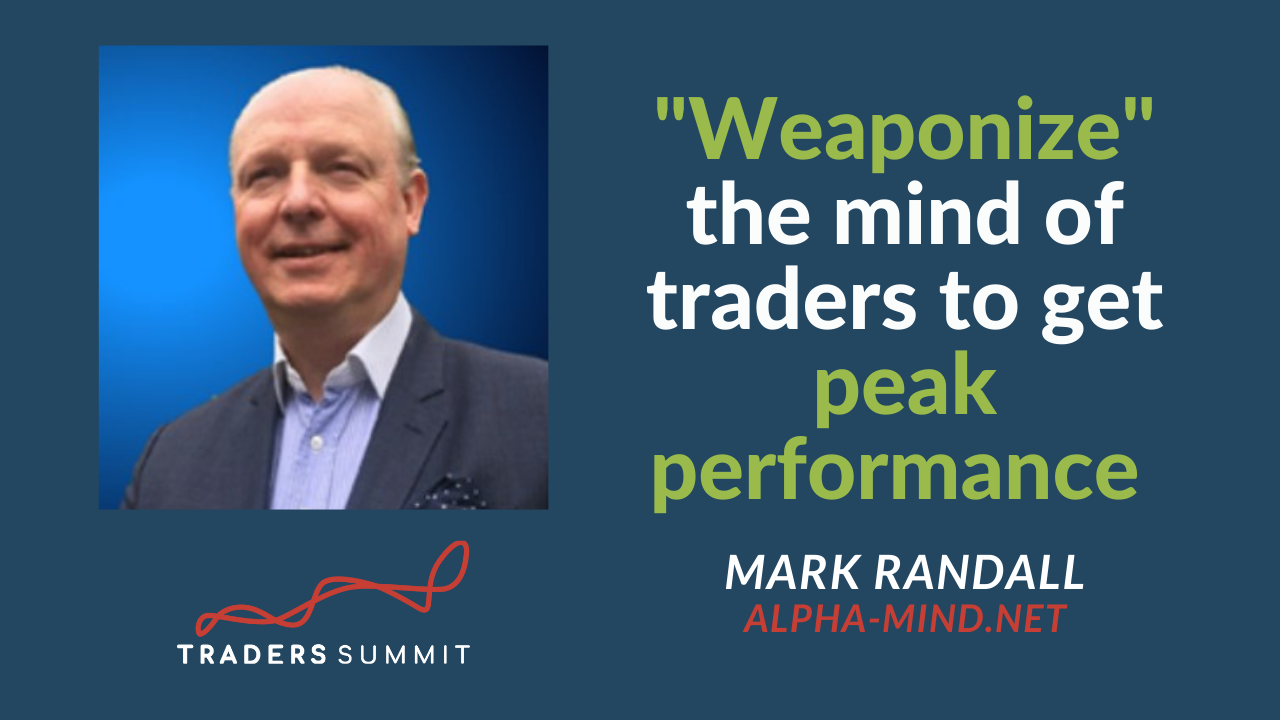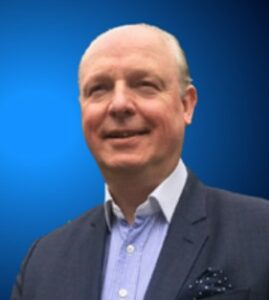Trading Psychology – Weaponize your mind

In this Trading interview, Blake Morrow sits down with Mark Randall from Alpha-minds.net. They discuss Trading psychology, and using trading psychology to weaponize the mind to get peak trading performance. He also discusses what some quick fixes would be for some of those common issues. Mark is one of the first open outcry traders on LIFFE (London International Financial Futures and Options Exchange) and works with traders to weaponize the mind to achieve peak performance.
Video Transcript – Trading Psychology Interview
Blake:
Hello traders this is Blake Morrow with Trader Summit and with me today I have Mr. Mark Randall co-founder of Alpha Mind. How are you Mark?
Mark:
Very well from London Blake. It’s good to see you, and I am on the other side of the pond and then a stretch of land in between so good to have you here today.
Blake:
I wanted to introduce you to the Trader Summit community because your specialty is something that I feel as a trader personality is something that every trader needs. You work with traders in more of a psychology standpoint of view. Do you want to tell us a little bit about what you do at Alpha Mind?
Mark:
Sure, we work on the mindset and sort of trading psychology behavior aspects of trading and developing yourself. You know the power of the person is a significant force that’s very much untapped. People often ask me can you make me a better trader? I start off by saying, “first I need to make you a better you.” I need you to try to regulate yourself and the ecosystem around you so that we work upon that ecosystem and our ecosystem can be a corporate system that surrounds it. It can be a corporate culture sure. It can be a partnership culture. It can be an executive culture. It can be the ecosystem around us. All the trades that you’re doing and kind of understanding some of that based upon some of our own experiences. We look at the whole and develop it from some things that we know people just don’t pay attention to. You know the sort of the the idea of weaponizing the mind is often the way we’ve placed it particularly in this world where you know performance and peak performance is pretty key.
We’re looking to develop and arm this weapon that you can create from this ecosystem through yourself into the market very often because we’re not managing cell phones. Because we’re not managing ecosystems. What we’re putting out as a weapon that turns mid-flight and actually point straight back at us, and all we’re doing is we’re going in defensive mode. We are trying to protect ourselves from this own thing that we’ve created, and so when we drag that into a complex market environment you know how aware we are going to be of the market. We’re going to fall over rapidly and fail and dwell on failing. Well in that state your Alpha Mind is tuned in to all of those rose elements about what can we tweak. What can we shift now? What can we do about you and I think you know the concept of hydration.
This concept is much discussed in the military, but not discussed in trading. But you’re up there (brain) is 80 water, and if you start getting dehydrated at the top of your head the thing that’s losing water the quickest is whatever’s on top. So hydration is important, oxygen is important, all those elements we’re looking at and going into systems or speaking with traders. Whatever they are, or even sales guys and brokers, you know which are quasi traders. If you’ve come from that market you know what I mean. And, just said, how can we make you better? How can we optimize you? How can we really really tune you into peak performance?
Blake:
That’s interesting! You know even just with the few minutes of listening to you I feel better about myself, already as a trader. By the way, your partner is Stephen Goldstein, who I have met over the course of the last year in the Traders Summit community. We’ve had him on as a guest speaker in the past during one of our panel events. So let me ask you this, “why should I as a trader seek help from you Mr. Mark Randle? Can you tell us a little bit about your background.
Mark:
Sure, I was a day trader on the London International Financial Futures Exchange. So, open outcry trader. That was in the early 1980s. I thrived and survived stupid markets through the 80s through the 90s. Cultural change, leadership change, product change, flow acceleration where factors suddenly opened up the markets to the whole world we went from doing this amount to that amount of everything. And having to get your head around that. I was lucky that in the 80s. This is how luck looks strange when you look back at it. But it was luck when I was getting sort of you know the panic attacks, and blackouts because of the pressure. I couldn’t go on an underground train without feeling as though someone was strangling me because I was carrying that stress into all sorts of environments. I also suffered from a back condition called, ankylosing spondylitis. Which is arthritis of the spine and so that was giving me all these reasons to suddenly find life a bit difficult.
I actually was speaking to my mother and she said, “look, your grandmother was really interested in healing. Go and find something on healing.” I thought really? So I went to something called the library. I found a research piece on healing, and it pointed me into this direction. You know if you look at it today as kind of quasi-mindfulness, but it was like exercises for the brain. And just these ways of using the breath and visualizations to kind of sort yourself out. I committed to this and that’s really important. So I committed to this process of change, and stuck with it. Within weeks I was calmer and more positive. You know I was dealing with complex things. I’d normally walk away from more engaging in terms of relationship, and building better business. I guess I found a secret weapon, and so I developed that through the years. I was running the broker desk of Greenwich NatWest when Greenwich was quite literally masters of the universe. They were turned up on us on the scene and we suddenly thought, okay, this is how you do it right. They were stealing people from Goldman Sachs rather than the other way around.
So that’s what was going on there. So we had to grow up, but you know my attitude, my mental capability kind of helped me take on that role right away. Through the 90’s and into the teen’s I was in Futures and I was developing complex things. With the commodity world in the background you know you have a trading instinct, because if you’re a broker there’s an awful lot of trades that end up being your trade for whatever reason. So you need to be super market aware, and of course portfolio aware because a trader is focused on that. But as a broker you were kind of looking at all these ideas and opportunities, and packaging them up for trader to understand. Then how to risk manage, and to look at it in terms of profitability. All that sort of thing.
Then I got to position mind fitness into the RBS Natwest global business, and I went bananas. It just went bonkers. And I was busier delivering mind fitness and mental capability programs than I was doing Futures.
Blake:
Interesting so that’s how you made the transition? Wow.
Mark:
So the transition kind of happened from a legacy dna piece. At this moment it got brought to the surface in me, and then as soon as the business saw that I had this capability of trading psychology it kind of flourished. I was bored of the bank conversations. It was like me and my line manager had nothing to do with each other. Because I was doing stuff that was helping people flourish and survive. I started to understand traders, ops guys, IT guys, and then it extended beyond the business. As I became a consultant I started to understand that it wasn’t really about the job as a some people had some horrific things going on in the background. It was all about having a toolkit to deal with that, and bringing about the proper work-life balance. All that way of really optimizing your ecosystem you know to drive you going forward. So, I became someone really involved in building up people’s ecosystems. So they could perform better in whatever they were doing. So I didn’t really start with the fact that I was going to make you a better trader. I was going to start the fact on and make you a better you first.
Blake:
That’s so interesting Mark. I feel that your aspect of the business is probably one of the most, I don’t want to say it’s the most overlooked. But it’s really quite overlooked and quite often traders think that they think about process. And they think about what can I do better to get it to yield a better result. Whether it’s an execution standpoint, or it’s the way I am viewing the markets. But a lot of times it’s really just deep inside and fighting some of those inner demons. And so with that being said, you know being a trader and working with trading psychologists over the years, how many years have you been working with people since you made that transition?
Mark:
That’s been about six years. But actually if you look back through my career I was doing trading psychology within the business which was essentially what I am doing now. Actually people were coming to me with trading psychology questions, and saying you, can you help me with this? And when you look back when you have these kind of skills, and that sort of attraction people tend to come to people that they think are wise for whatever reason.
Blake:
Sure and with your knowledge and many years of doing this you have a very good sample size of of traders that you’ve worked with. Maybe you can you can help me along the way with traders that you’ve worked with. What would you say is the most common “worst trait” of a trader? What is the most common trait that you’ve come across?
Mark:
Well if you look at the people that stood out as being bad traders, irritable. Looking as though they were stressed all the time. Yeah, impatient, really bad to be with, very loud. Very boastful of things that often they were trying to make bigger than they actually were to say they always made money. When actually you knew that they weren’t.
Blake:
Holy cow! Are they all on social media? Because I think I see them all on Twitter. I’m just kidding.
Mark:
Another thing was that they had very poor education based around markets. So they kind of just got into the role and did a job job job job job job as it was just a nine to five job. They didn’t embrace the fact that they needed to learn. They needed to read. They needed to to learn technique about themselves and learn the market about the product. Even the appropriate foundation of things like technical analysis. Look at some of the technical analysis of analysis people are doing on screens even to this day you will conclude that 95% of people that are trading now for professional businesses have not got a clue what they’re doing.
Blake:
It’s a great point. Great point.
Mark:
So that defines bad. That to me that’s bad, and you see bad very very often. And you see people the almost the “lastminute.com”, you know payroll’s coming up and it’s like okay I need to put a buy stop in there just in case it takes off. With a take profit up here. I want to put a sale stop in at the same time, and I’m putting this stuff in and take profit on the sale stop. And they wait for payroll to come out, and bang! That’s their trade. That’s their trade of the week. The worst trade I ever saw was when someone put that in. It was so stupidly busy that the buy stop got triggered on the way up at market price. It got filled above the sale price, and within seconds the market had collapsed. It triggered the sale stop and the sale stop got triggered at below the take profit level.
You explain that to someone that had a $10 billion Euro fund.
Blake:
Oh my goodness, wow!
Mark:
In a thousand contracts per trade.
Blake:
You’re working with an institutional size trader that really shouldn’t be dealing in those sizes. I mean let’s be honest here.
Mark:
Absolutely True.
Blake:
I’ve never traded for a bank. But I have done a lot of facets in this business and I have traded a lot of different instruments. But it’s amazing after so many years you still see a lot of people that control large amounts of money that do make quite often those types of mistakes. But let me ask you this then. We’re going to end it on on a on a positive note. So with your sample size, and all the traders and people you’ve worked with over the years, what do you say is the most common easy fix. What would be the most common place for me as a trader to start working on?
Mark:
Good journaling is important. I think a lot of people focus on that. But but if you put something in the journal that’s a negative, that was a bad moment, then you should write it in size two font. So when you look back in time it doesn’t hit you in the face as a negative. Because from a mindfulness point of view it’s all about triggers and tripwires. You don’t want to be inadvertently trip wiring yourself into a negative thought process about a disaster. And you’re bringing yourself back in time to that disaster. So you can’t let go, and you’re reliving that disaster. You want to try to avoid that. So that’s number one tip.
The second tip is you know the ability to step away. But step away physically, and get out in the garden to get some fresh air. Find a place where you just sit and you tune into the environment. Nothing breathing or anything. Just sense the smells and see what you can see. See how many colored greens you can see, and just tune into your senses of wherever you are outside. Fit that into your day. Even if it’s like 20 seconds. Little little pauses. Little and often will keep this fresh. It will keep it (your brain) market ready. I mean in trading psychology that’s what you want to keep market ready. It will keep your awareness aware and attentive. Because all this stuff gets in your way if you don’t manage it. So keeping yourself aware, staying aware, looking for opportunities. Making yourself awake to the moment. That’s a very critical point. All this is about is waking up. It’s not about falling asleep. It’s about waking up to the moment that is the market. That is the only way you’ll be able to manage and see any opportunity.
Blake:
Well Mark there’s a lot to unpack here. I have to say that spending this this short period of time with you has been very beneficial to me. What I would like to do the next time we meet is to work on my issues, and some issues that might be so common. Or, more common to some of the other traders out there. I think you might actually have fun with this and I might cringe a little bit. How about that?
Mark:
I would say that one of the best traders, or the best trader I ever knew wasn’t a trader. He looked at the market philosophically, and that he looked at the market as a vibration, rather than a bunch of lines. He made more money than anybody I have ever known, and for seven years he never took a loss. That’s every trade he booked made money. There are rare cases of people out there that are the genius. That have thought it through and spent the time. I sent him two years of point and figure charts when he was trying to work out what to do. That’s how much work he did to work out the way he was going to trade. And he was not a trader. He had no screen in front of him. And, he made more money than I have ever known anybody to make in the markets.
Actually, there are some traders out there that are retail traders that are better than most professionals.
Blake:
You know what, without going too far into it. I’m actually taking notes right now and think I know why. But people are gonna have to wait for our next meeting.
Mark, I truly appreciate our time here. So, how do people find out more about you and what you do?
Mark:
Alpha-mind.net is a brand new glorious website which shows the trading psychology work of Stephen, and I. Our Twitter feeds are: alphamind101 and alphamind102. We’re all over Linkedin. We have a Linkedin channel called alphamind. Those are the ways of looking at us and finding out a bit more about what we do with trading psychology. Of course anyone that feels as though that they they need some further trading psychology professional guidance can of course find more about our services.
Blake:
Guys and gals you can find out more about Mark Randall and what he does with his with his partner Steven directly on their site. Also, make sure you’re checking back at tradersummit.net because we post some of their podcasts here.
Mark, thank you so much for spending your time with us today and explaining more about trading psychology. Have a great one!
2021108








